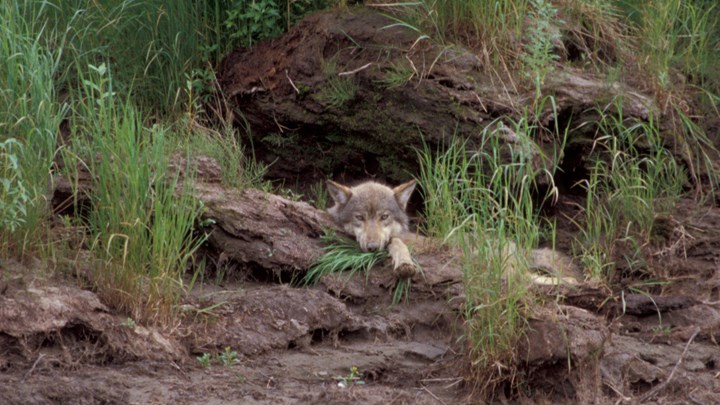
by Cody McLaughlin - Sunday, May 5, 2019

In a surprise move and a win for anti-hunting extremists in Minnesota, on Tuesday State Representative Peter Fischer of the Democratic-Farmer-Labor Party Caucus introduced a ban on wolf hunting as an amendment to a larger environment and natural resources bill. In a puzzling move, the next day Gov. Tim Walz, who is a hunter himself, indicated his support for the ban on wolf hunting.
“This is a big change in policy for them,” commented Michael Jean, associate litigation counselfor the National Rifle Association Institute for Legislative Action(NRA-ILA). “The Minnesota DNR participated in the litigation to delist the gray wolf in the Western Great Lakes region back in 2011. There, they highlighted the success of the first regulated wolf harvest in the state’s history. And the plaintiffs alleged that (presidential hopeful Democrat) Senator (Amy) Klobuchar improperly influenced the (U.S.) Fish and Wildlife Service’s (USFWS) decision in delisting the wolves.”
What Happened
Sources on the ground indicated that it appears as if Fischer was unable to gather enough support for his proposed stand-alone wolf-hunting ban (House Bill 1327), which he introduced Feb. 18. After the bill sat in the House Environment and Natural Resources Committee with a companion bill in the Minnesota Senate (Senate Bill 927 was introduced Feb. 7 by Senator Chris Eaton, also of the Democratic-Farmer-Labor Party and likewise sat in the Senate Committee on Environment and Natural Resources Policy and Legacy Finance), Fischer pulled a procedural trick to sneak his bill in as an amendment to the greater omnibus package.
Wolves in Minnesota
Biologists with the Minnesota Department of Natural Resources indicated to the Twin Cities Pioneer Press in a recent report that the wolf population is most concentrated in the northeast portion of the state. It is stable and able to withstand limited hunting and trapping. In September, the agency estimated the population around 2,655 wolves in 465 wolf packs.
Additionally, Minnesota is the only state in the contiguous United States where wolves were never extirpated, and Minnesota was the first state to adopt a wolf season when it was made legal again. (It was only stopped when wolves were afforded protection under the Endangered Species Act.)
As this website has covered previously, the U.S. Department of The Interior (DOI) has officially directed the USFWS to begin the legal process required to remove gray wolves (Canis lupus) in the Lower 48 states from protection under the Endangered Species Act (ESA). In fact, DOI Secretary David Bernhardt was quoted as saying, “The facts are clear and indisputable, the gray wolf no longer meets the definition of a threatened or endangered species.”
As these groups pushed their legal attempts to keep wolves listed indefinitely, the states of Minnesota, Michigan and Wisconsin fought alongside the National Rifle Association, Safari Club International and other pro-hunting organizations in suits that vindicated scientific management of the wolves through state fish and wildlife agencies. “The states were adamant about regaining management of their wolves, which necessarily includes the authority to hold a hunt,” Jean added. He repeated that, if passed, “this would be a major shift in policy” for Minnesota.
Backlash Over “Sleazy” Procedural Tricks
It is a longstanding maneuver to use omnibus bills to sneak legislation onto the floor and that is exactly what Fischer did. Bruce Tague, government affairs director for the Sportsmen’s Alliance said, “Bottom line: He knew, or was quite certain, that the omnibus bill would pass so he ‘airdropped’ his amendment into it. It’s a sleazy tactic but is effective because no one knows it’s coming and it is hard to defend against.”
The ban was only slipped into the omnibus bill passed by the Minnesota House. It does not exist in the state Senate’s version of the bill, which only passed by one vote (66 to 65), while the full House omnibus bill passed by a greater margin, likely due to it being a spending package. The Senate rejected the omnibus bill as passed by the House and the matter will now have to be negotiated in a conference committee made up of both state senators and representatives. This is where hunting advocates see their opportunity to fight to get the ban removed.
About the Author
Cody McLaughlin is a noted conservationist and conservative thought leader on public policy issues including hunting, fishing, gun rights, free-market tax and wage policy and the environment. He works as a GOP consultant for conservative political causes, managing clients’ digital communications and online presence and as a trustee of the New Jersey Outdoor Alliance, helping to represent the state’s 1.2 million sportsmen in the political arena. (Read about other NRAHLF.org writers and photographers on our Contributors page.)
Follow NRA Hunters’ Leadership Forum on Twitter @HuntersLead.
E-mail your comments/questions about this site to:
[email protected]
Proudly supported by The NRA Foundation and Friends of NRA fundraising.
